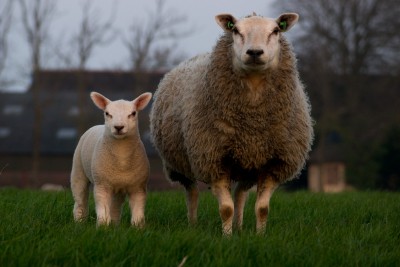URI Offers Free Fecal Egg Count Analyses to Assist New England Farmers
Amy Barkley, Livestock Specialist
Southwest New York Dairy, Livestock and Field Crops Program

Small Ruminant Producers:
Do you want more parasite resistant animals?
Summer 2020: Free Fecal Egg Count (FEC) analysis to assist with selective breeding for resistance to gastrointestinal worms
AVAILABLE TO:
New or current National Sheep Improvement Program (NSIP) members either in or marketing to the Northeast who want to generate Estimated Breeding Values (EBV) for parasite resistance.
o Producers must be able to obtain and ship fecal samples once or twice (at least 4 weeks later) following NSIP recommendations.
o Animals must NOT have been dewormed within 4 weeks of sampling.
o Fecal egg counts can be conducted for all young stock whose data is being submitted to NSIP.
o For more information on the benefits of membership in NSIP please visit http://nsip.org/ or contact the NSIP Program Director, Rusty Burgett, (info@nsip.org).
OR
Non-NSIP members living in New England, NY, NJ, PA, WV, MD, DE
o Have a history of problems with gastrointestinal nematode worms.
o Are FAMACHA certified (online training program is available).
o Are willing to share FAMACHA scores as well as general herd/flock information/history.
o Have the ability to obtain and ship fecal samples once or twice (at least 4 wks later).
o Animals must NOT have been dewormed within 4 weeks of sampling.
o To allow us to provide this service to the maximum number of producers we are focusing the FEC testing on young replacement animals.
Samples will be accepted for analysis through September 30, 2020.
FAMACHA© scores can be used to indicate that worm season is active and will provide fecal egg counts high enough for meaningful analysis (minimum herd average >500 eggs/g). Scores of 3 or higher in 10% or more of your flock/herd or an overall upward trend in FAMACHA© scores away from normal 1's and 2's indicate increasing parasite loads. Peak parasite season occurs typically from mid-July through mid-September in most of the U.S. NSIP producers should plan on submitting a first set up samples in July to allow for the 30 to 45 days needed before sending the second set of samples.
Please contact Holly Burdett or Dr. Katherine Petersson, University of Rhode Island at urisheepandgoat@etal.uri.edu to obtain appropriate fecal sampling and shipping instructions. Please include your name, farm name, mailing address, and whether an NSIP member.
For more information on small ruminant parasite control visit our website at http://web.uri.edu/sheepngoat.
Announcement: Free Fecal Egg Count (FEC) Analysis by URI (pdf; 950KB)
Upcoming Events
WNY Pastureland Conversion & Soil Health Field Day
July 16, 2025
Middleport, NY
Join American Farmland Trust for the Western New York Soil Health Field Day on July 16, 2025, at Zeliff Farm in Middleport, NY, from 9:00 AM-3:15 PM. Learn about pasture conversion, soil health benchmarking, biochar in grazing systems, and best grazing practices. Plus, enjoy hands-on demos with the NY Soil Health Trailer, drones, and cover crops! Check out the attached agenda for more information about the field day and REGISTER HERE. Zeliff Farms is a regenerative beef operation who has recently partnered with AFT on outreach and education to farmers including learning circles and evaluating biochar effects on soil health.
IPM Strategies to Protect Corn and Soybean Seed in NY
July 30, 2025
Hamburg , NY
SWNYDLFC and Cornell IPM are hosting a grower meeting to discuss integrated pest management strategies for protecting corn and soybean seed in New York.
FAMACHA Training for Sheep and Goat producers in Woodhull NY
August 13, 2025 : FAMACHA Training in Woodhull
Woodhull, NY
Join us for a discussion and hands-on training for internal parasite integrated pest management in sheep and goats. Certification is available to all students participating in the workshop.
Announcements
No announcements at this time.





